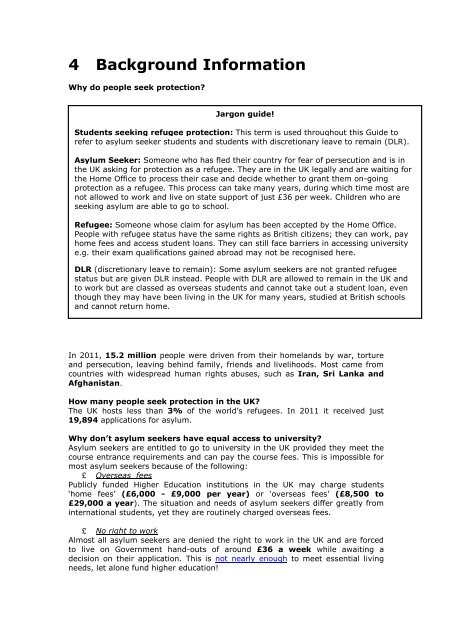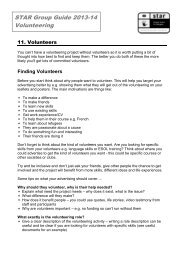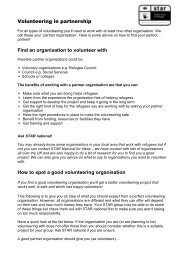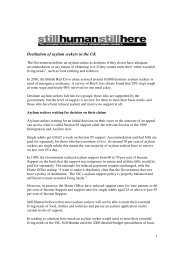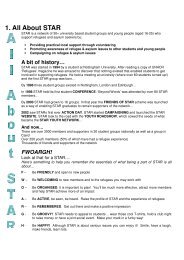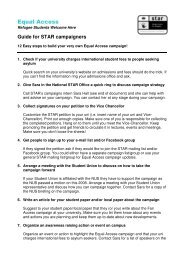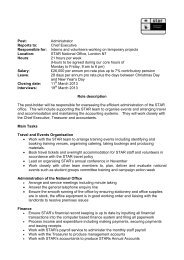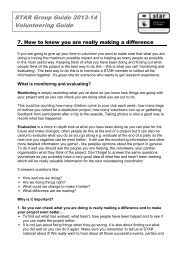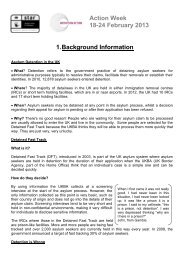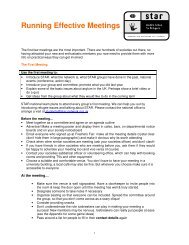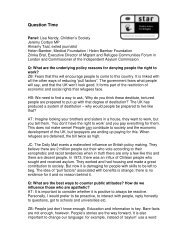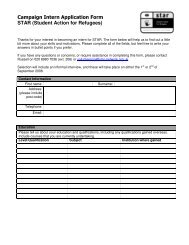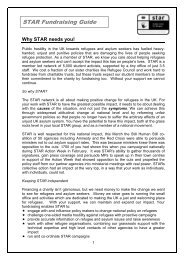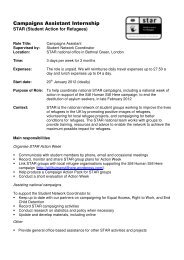4 Background Information - Student Action for Refugees
4 Background Information - Student Action for Refugees
4 Background Information - Student Action for Refugees
Create successful ePaper yourself
Turn your PDF publications into a flip-book with our unique Google optimized e-Paper software.
4 <strong>Background</strong> <strong>In<strong>for</strong>mation</strong><br />
Why do people seek protection?<br />
Jargon guide!<br />
<strong>Student</strong>s seeking refugee protection: This term is used throughout this Guide to<br />
refer to asylum seeker students and students with discretionary leave to remain (DLR).<br />
Asylum Seeker: Someone who has fled their country <strong>for</strong> fear of persecution and is in<br />
the UK asking <strong>for</strong> protection as a refugee. They are in the UK legally and are waiting <strong>for</strong><br />
the Home Office to process their case and decide whether to grant them on-going<br />
protection as a refugee. This process can take many years, during which time most are<br />
not allowed to work and live on state support of just £36 per week. Children who are<br />
seeking asylum are able to go to school.<br />
Refugee: Someone whose claim <strong>for</strong> asylum has been accepted by the Home Office.<br />
People with refugee status have the same rights as British citizens; they can work, pay<br />
home fees and access student loans. They can still face barriers in accessing university<br />
e.g. their exam qualifications gained abroad may not be recognised here.<br />
DLR (discretionary leave to remain): Some asylum seekers are not granted refugee<br />
status but are given DLR instead. People with DLR are allowed to remain in the UK and<br />
to work but are classed as overseas students and cannot take out a student loan, even<br />
though they may have been living in the UK <strong>for</strong> many years, studied at British schools<br />
and cannot return home.<br />
In 2011, 15.2 million people were driven from their homelands by war, torture<br />
and persecution, leaving behind family, friends and livelihoods. Most came from<br />
countries with widespread human rights abuses, such as Iran, Sri Lanka and<br />
Afghanistan.<br />
How many people seek protection in the UK?<br />
The UK hosts less than 3% of the world’s refugees. In 2011 it received just<br />
19,894 applications <strong>for</strong> asylum.<br />
Why don’t asylum seekers have equal access to university?<br />
Asylum seekers are entitled to go to university in the UK provided they meet the<br />
course entrance requirements and can pay the course fees. This is impossible <strong>for</strong><br />
most asylum seekers because of the following:<br />
£ Overseas fees<br />
Publicly funded Higher Education institutions in the UK may charge students<br />
‘home fees’ (£6,000 - £9,000 per year) or ‘overseas fees’ (£8,500 to<br />
£29,000 a year). The situation and needs of asylum seekers differ greatly from<br />
international students, yet they are routinely charged overseas fees.<br />
£ No right to work<br />
Almost all asylum seekers are denied the right to work in the UK and are <strong>for</strong>ced<br />
to live on Government hand-outs of around £36 a week while awaiting a<br />
decision on their application. This is not nearly enough to meet essential living<br />
needs, let alone fund higher education!
£ Not allowed to apply <strong>for</strong> student loans<br />
In 2010/11 approximately 81% of all English students took up a student loan of<br />
an average value of £3,630 (<strong>Student</strong> Loans Company 2011). This loan combined<br />
with income from work, savings or other support allows students to cover tuition<br />
and living expenses. Many students would not have been able to go to university<br />
without a student loan, yet the Government refuses to give student loans to<br />
asylum seekers.<br />
National focus: Scotland takes a stand on Equal Access <strong>for</strong> asylum seekers<br />
In England, Wales and Northern Ireland asylum seekers must generally pay<br />
international fees and are not eligible <strong>for</strong> a student loan. In Scotland, however, if they<br />
are the child of an asylum seeker or a ‘young asylum seeker’ and meet precise<br />
residence conditions, they are classified as home students and are eligible <strong>for</strong> a student<br />
loan <strong>for</strong> their tuition fees. (Sadly this does not apply to <strong>Student</strong> Support <strong>for</strong> living costs.<br />
And nor does it apply to NHS Bursaries.)<br />
Check out the UKCISA website <strong>for</strong> more details: www.ukcisa.org.uk/<br />
Why don’t individuals with DLR have equal access to university?<br />
Now you see it, now you don’t! Until February 2011, individuals granted DLR<br />
(discretionary leave to remain) in the UK as a result of an asylum application<br />
were eligible <strong>for</strong> student loans and paid home fees across the UK, just like British<br />
citizens and those with refugee status. In February 2011 the Government<br />
reversed this decision.<br />
This change has disproportionately impacted on vulnerable young people who<br />
have sought asylum in the UK. Of the 3,000 separated children who apply <strong>for</strong><br />
asylum in the UK each year from countries<br />
such as Afghanistan, Iran and Iraq, most<br />
are granted DLR until they are 17 ½.<br />
Be<strong>for</strong>e reaching 17 ½, they can apply <strong>for</strong> an<br />
extension <strong>for</strong> another three years, after<br />
which they will apply to stay in the UK<br />
indefinitely. The number of young people<br />
who receive an extension of DLR and who<br />
are in a position to go through university is<br />
very low – around 290 <strong>for</strong> the past five<br />
years. Unlike other care leavers, they are<br />
now excluded from education at a crucial<br />
point in their lives.<br />
Who benefits from Equal Access?<br />
Here are just a few reasons why Equal<br />
Access is good <strong>for</strong> everyone:<br />
<strong>Student</strong>s seeking refugee protection<br />
Research by UNICEF (2005) and the<br />
Refugee Support Network (2012) has<br />
shown that, once in the UK, education is a<br />
high priority <strong>for</strong> many refugees and in<br />
recent years countless asylum seeker<br />
students have proven their ability to<br />
achieve fantastic results at university in the<br />
National focus: regulations on access to<br />
higher education <strong>for</strong> students with DLR<br />
vary around in the UK<br />
England: students with DLR must pay<br />
international fees and they are not eligible<br />
<strong>for</strong> student loans or NHS bursaries<br />
Wales and Northern Ireland: students with<br />
DLR may be given ‘home fee’ status,<br />
although if the student is a family member<br />
certain conditions apply. They may also be<br />
eligible <strong>for</strong> a student loan, however they<br />
must have been living in the UK <strong>for</strong> 3 years<br />
and if the student is a family member<br />
certain conditions apply. Northern Ireland<br />
allows access to NHS bursaries, Wales<br />
doesn’t.<br />
Scotland: students with DLR are entitled to<br />
pay ‘home fees’ and eligible <strong>for</strong> student loan<br />
and NHS bursaries (yey!).<br />
Check out www.ukcisa.org.uk <strong>for</strong> more<br />
details.
face of many obstacles. Upon completing their degrees, <strong>for</strong> example, asylum<br />
seeker members of STAR have gone on to successful careers in diplomacy,<br />
advocacy, banking and healthcare.<br />
As most asylum seekers are denied permission to work, attending university<br />
gives them an opportunity to build skills that will help them to build their life in<br />
the UK or when they return to their country of origin. University is a great place<br />
to make new friends and studying provides stability which can mitigate the<br />
negative effects of traumatic experiences (Refugee Council 2005). The lives of<br />
those seeking refugee protection are already extremely difficult and current policy<br />
is making their lives unnecessarily harder.<br />
Universities<br />
Imagine if Einstein and Marx had never been given the chance to study… Yep,<br />
you guessed it. Both of these great thinkers were refugees! Universities want the<br />
very best students, with academic skills and commitment. <strong>Student</strong>s who are in<br />
the UK seeking protection have often studied hard in difficult circumstances to<br />
meet the entry requirements and demonstrate strong motivation and intellectual<br />
ability. Because each university has the power to exercise discretion in the<br />
granting of ‘home’ or ‘international’ fees they are in a unique position to welcome<br />
such students on the same terms as their British-born peers.<br />
Several universities are already enjoying the benefits of Equal Access and, in<br />
doing so, have demonstrated their commitment to diversity and equal<br />
opportunities. These include: Manchester University, Leeds University, Royal<br />
Holloway University, Sal<strong>for</strong>d University, Canterbury Christ Church University and<br />
other members of the Cathedral group of universities.<br />
British society<br />
82% of Brits believe that protecting the most vulnerable is a core British value<br />
and 67% are sympathetic to refugees coming to Britain (Refugee Council 2011).<br />
We should be proud to welcome them into the respected academic institutions<br />
which help make our country what it is!<br />
Ensuring that everyone has an equal opportunity to access education is<br />
fundamental <strong>for</strong> British society as a whole. Asylum seekers are not asking <strong>for</strong><br />
special treatment, simply the same opportunities as other UK residents.<br />
Fahran (18) from Afghanistan: why Equal Access is important<br />
“When I came to the UK from Afghanistan, going to school was an adventure <strong>for</strong> me – I<br />
had never been be<strong>for</strong>e. I would stay late at school, until it was dark. I loved to learn then<br />
and I still do. At first I was put in Set 5 <strong>for</strong> English, right at the bottom…[but] I was<br />
working really hard and I was moved up to Set 2 after a few months.<br />
It was only when I got halfway through Year 11 that I realised about GCSEs. I had never<br />
sat exams in Afghanistan, some older men in my village would just teach me and my<br />
brother at our house. I got 4Bs and 2As, as well as distinctions in two BTEQs.<br />
I am now starting Year 13, and try to act as a role model <strong>for</strong> younger boys...I hope to<br />
become a civil engineer...My teachers think I could go to Ox<strong>for</strong>d or Cambridge.<br />
I didn’t know about student finance, that I am not eligible, until I met with a Connexions<br />
worker. It has made me worried, and along with my asylum case has been difficult to deal<br />
with. It can be distracting, and I know I need to put work in to my A-Levels if I want to<br />
apply to good universities.”<br />
With thanks to Refugee Support Network.


